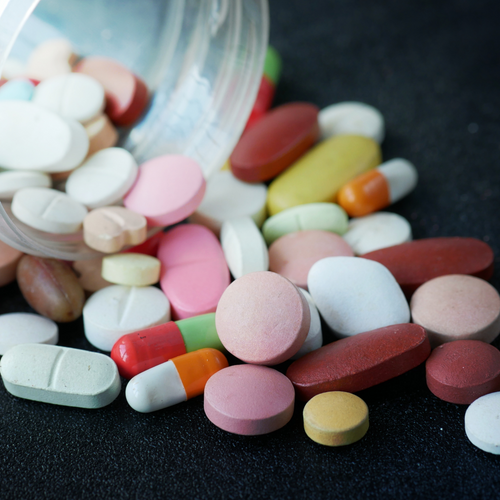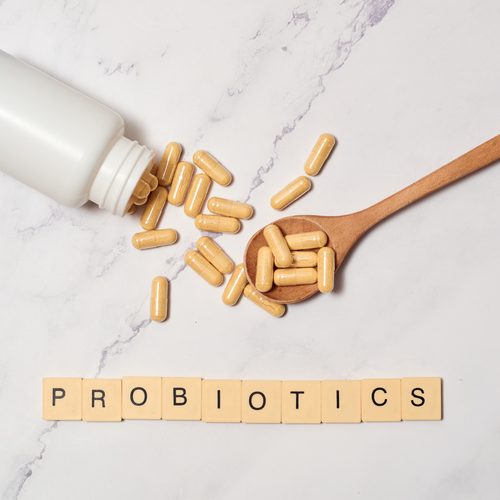What to remember :
A bloated stomach after eating is often linked to slow digestion, excessive fermentation or swallowed air.
The intestinal microbiota plays a key role : an imbalance can accentuate bloating.
Walking, breathing deeply or drinking herbal tea are simple and effective ways to relieve discomfort.
Adapting your diet (soluble fiber, fermented foods rich in natural probiotics , reducing FODMAPs, etc.) helps limit gas.
A healthy lifestyle (movement, chewing, stress management, sleep) can prevent bloating in the long term.
Introduction
Who hasn't experienced that bloated stomach feeling after a meal, accompanied by discomfort that can be difficult to ignore? Postprandial bloating is common and can quickly ruin a relaxing moment. It's often linked to slow digestion, gas buildup, stress, or certain foods that ferment in the gut. The good news is that there are simple and effective ways to get a flatter stomach and feel better quickly.
Why do we feel bloated after a meal?
Slowed or disturbed digestion
After a meal, it's normal to feel full. But when digestion slows down, this can quickly turn into discomfort, with your stomach feeling like it's swelling up.
Normally, food is gradually broken down by digestive enzymes in the oral cavity and then transported to the intestine, where digestion continues unhindered. But when this process is disrupted, food remains in the stomach or lower intestine for longer, which promotes fermentation, gas production, and therefore bloating.
Several factors can slow down or disrupt digestion. Stress, for example, has a direct effect on our digestive system: it alters intestinal motility and reshuffles the production of digestive juices. Similarly, a meal that's too large, too fatty, or swallowed quickly without chewing enough overloads the stomach and complicates digestion. The result: a tense, sometimes painful stomach and a lasting feeling of heaviness.
Excessive fermentation in the intestine
Another major factor in post-meal bloating is excessive fermentation in the gut. This natural phenomenon becomes problematic when exacerbated by an imbalance in the microbiota or the consumption of foods high in fermentable sugars.
Our gut microbiota —the collection of billions of bacteria, viruses, yeasts, and fungi that live in our colon—plays a central role in digestion. Some of these bacteria ferment undigested food residues (known as prebiotics , such as fiber or certain carbohydrates) for energy. This process naturally produces gases (hydrogen, carbon dioxide, and sometimes methane). In moderate amounts, this often goes unnoticed. But when the microbiota is imbalanced (dysbiosis) or when highly fermentable foods are over-consumed, these gases build up, causing sometimes dramatic bloating.
Among the foods most likely to ferment in the intestine are FODMAPs: short-chain carbohydrates poorly absorbed by the small intestine. They include certain sugars (fructose, lactose), soluble fibers (fructans, galacto-oligosaccharides), and polyols (sorbitol, mannitol). These compounds are very present in legumes, cabbage, onions, apples, and dairy products.
In some more sensitive individuals, such as those suffering from irritable bowel syndrome, these fermentations can cause significant discomfort or even abdominal pain. Adjusting your diet can often help limit these discomforts and restore a lighter stomach.
Swallowed air or posture
Sometimes that bloated stomach after a meal isn't due to what you eat, but to how you eat. Swallowing air without realizing it—called aerophagia—is a common phenomenon. It's caused by certain habits like eating too quickly, talking while eating, chewing gum, or drinking through a straw. As a result, air accumulates in the stomach and intestines, causing bloating and belching.
Another often overlooked factor is posture. Slouching or sitting awkwardly during or after meals can compress the digestive organs and hinder the normal movement of food. Conversely, an upright posture, calm breathing, and a gentle walk after meals can promote smoother digestion.
7 tips to reduce bloating after a meal
Do you feel bloated after eating? There's no need to wait for it to go away on its own: some simple habits can help you quickly regain better digestive comfort.
#1 - Move gently after meals
A short 10- to 15-minute walk is often enough to restart bowel movements and promote the elimination of gas. This small exercise gently mobilizes the abdominal muscles and stimulates bowel movements without disrupting digestion.
#2 - Breathe deeply
Stress can contribute to bloating . Practicing abdominal breathing or a few minutes of cardiac coherence can help soothe the nervous system, relax the stomach, and improve digestive comfort.
#3 - Drink a carminative herbal tea
Certain plants are known for their antispasmodic and soothing properties on the intestine. Fennel, chamomile, peppermint, ginger, and anise are ideal as an infusion after a heavy or fermentable meal.
#4 - Apply a warm hot water bottle to your stomach
Heat relaxes abdominal muscles and can relieve cramps or spasms associated with bloating. A hot water bottle placed on the lower abdomen for 15 to 20 minutes helps relieve tension and promote digestive well-being.
#5 - Adapt the next meal to limit gas
To give your digestive system a break, it's best to avoid certain gas-producing foods like cabbage, onions, and garlic, poorly prepared legumes (unsoaked or poorly rinsed), or carbonated drinks. Opt for gentle cooking and thorough soaking of legumes to make them more digestible.
#6 - Massage your stomach in the direction of the colon
A gentle abdominal self-massage can help move trapped gas. Follow the path of the colon: start at the bottom right, move up toward the top of the belly, cross to the left, and then down to the bottom left—in a clockwise direction.
#7 - Return to a lighter diet temporarily
After a bout of bloating, it's advisable to eat a simple, soothing meal: cooked vegetables, little irritating fiber, quality fats (preferably raw, such as raw olive oil), and no excess raw vegetables. This helps rest the digestive system and prevent the stomach from swelling again.
And as a preventative measure, what can you do to avoid bloating?
Prevention is better than cure: a few daily habits can make all the difference in limiting bloating after meals.
-
Eat slowly and chew well : Digestion begins in the mouth. Taking the time to chew makes it easier for the stomach to function and limits swallowed air.
-
Focus on soluble fiber and fermented foods : Soluble fibers (found in oats, carrots, zucchini, etc.) are gentler on the gut and help nourish the microbiota. Fermented foods rich in natural probiotics (such as kombucha , kefir , raw sauerkraut, miso, fermented tofulacto , etc.) help enrich and maintain the intestinal flora.
-
Be aware of digestive sensitivities : Some people react badly to certain foods containing FODMAPs, lactose, or gluten. Identifying these and reducing the amount of these foods can greatly improve digestive comfort.
-
Vary your diet to nourish your microbiota : the more diverse the diet, the more balanced the microbiota, which limits excessive fermentation.
-
Manage your stress and ensure good sleep : a calm nervous system promotes smooth digestion. Relaxation, gentle physical activity, breathing, restful sleep... everything counts!
Conclusion
Having a bloated stomach after a meal is common... but it's not inevitable.
With a few simple actions—walking, breathing, drinking herbal tea—it is often possible to quickly relieve discomfort.
And in the long term, an adapted lifestyle (diet, stress management, lifestyle) is the best ally for regaining a light, serene stomach and good digestion.
Sources :
[1] MédecinDirect, 2022, The ultimate guide to digestion: understand it better to improve it, consulted from: https://www.medecindirect.fr/blog/le-guide-ultime-de-la-digestion-mieux-la-comprendre-pour-lameliorer
[2] Huerta-Franco, MR, Vargas-Luna, M., Tienda, P., Delgadillo-Holtfort, I., Balleza-Ordaz, M., & Flores-Hernandez, C. (2013). Effects of occupational stress on the gastrointestinal tract. World journal of gastrointestinal pathophysiology, 4(4), 108–118. https://doi.org/10.4291/wjgp.v4.i4.108
[3] Annick Bernalier. Fermentative metabolism by the human gut microbiota. Clinical and Biological Gastroenterology / Research and Clinics in Hepatology and Gastroenterology, 2010, 34 (4-5), pp.17-23. https://hal.inrae.fr/hal-02653740v1
[4] Inserm, 2022, FODMAPs, sugars that alter the intestinal barrier, consulted from: https://www.inserm.fr/actualite/les-fodmaps-des-sucres-qui-alterent-la-barriere-intestinale/
[5] Cleveland Clinic, 2024, Aerophagia, accessed from: https://my.clevelandclinic.org/health/diseases/aerophagia













